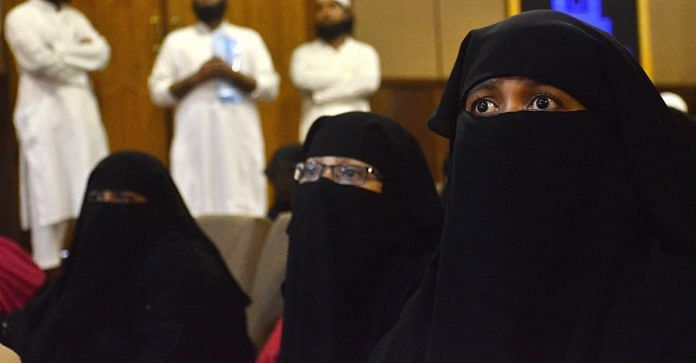The Congress’ position on the bill remains ambiguous with none of its leaders either endorsing or rejecting the amendment that they pushed for.
New Delhi: While the BJP has sought to allay the concerns of the Opposition and Muslim women groups on its triple talaq bill by amending some of the most controversial provisions, the Congress party’s position on the issue continues to remain ambiguous — giving off the impression that even three decades after the Shah Bano debacle, the party is unable to shed its “minority appeasement” tag.
This perception is likely to only get strengthened given that the bill has failed to be taken up in this session of Parliament due to the lack of consensus among political parties Friday.
Also read: Onus of filing triple talaq FIR should rest only on the victim: Mulism women’s body
A day after the Cabinet cleared amendments to the draft bill and sought to table it in the upper house of Parliament, Congress leader Sonia Gandhi Friday said, “Our party’s position is absolutely clear on this, I will not say anything further.”
The Congress along with other opposition parties and Muslim women’s groups had insisted that the bill must include the provision of bail for the accused — a demand which the Centre has now heeded to — yet no one from the party has come forward to either welcome or criticise the development.
Congress leaders, instead, insisted that the government should debate the alleged scam in the Rafale fighter jet deal with France – compelling critics to argue that the party is not in the mood to antagonise orthodox Muslim groups.
‘Still under influence of Personal Law board’
Former Congress minister Arif Mohammad Khan, the catalyst behind the triple talaq bill, said that some people are still under the influence of the All India Muslim Personal Law Board (AIMPLB).
“I am not naming anyone but some people think that hobnobbing with the AIMPLB is still more politically useful for them than helping Muslim women,” he said.
Zakia Soman, a Muslim social activist, who spearheaded the campaign against the criminalisation of triple talaq, too shared Khan’s view.
“What is the politics that the Congress is trying to play? They have called us (Muslim women’s groups) for deliberations on the issue on at least three occasions and cancelled the meetings or just not followed up,” she said. “They are still not coming out of their Shah Bano mindset.”
Also read: Who really influenced Rajiv Gandhi to act against Shah Bano judgment?
“Whether you like it or not, the BJP government has come out looking very sincere in this whole thing,” Soman said.
While Soman along with other social activists had criticised the bill in its earlier form, given the scope of its misuse, she welcomed the amended bill as one very close to the demands of Muslim women.
“See, the earlier provisions were very draconian,” she said. “But the amendments are a welcome move.”
As per the amendments, an FIR may be registered in a triple talaq case only at the behest of an aggrieved wife or a close relative – as opposed to the earlier provision, under which anyone could initiate criminal proceedings against a Muslim man for instant divorce.
Further, while the “crime” would still remain non-bailable, as per the revised bill, a magistrate would be equipped to grant bail after hearing the victim. Lastly, the amendments make the offence a compoundable one, which basically leaves room for reconciliation.




Personal laws pertaining to divorce and marriage are anchored in religion in India. After striking down instant triple talaq, the Supreme Court is now looking at the practice of Nikah Halala and polygamy in the country. It is said that this rule, Nikah Halala, was established by the Prophet himself but, there is no such thing as Nikah Halala in Islam or mentioned in the Quran. It is a word coined by Muslim men for their convenience and has been followed by a small part of the Muslim community.